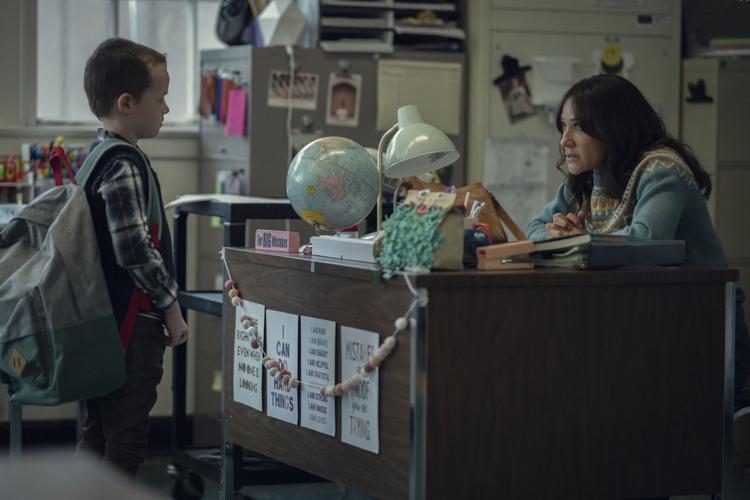Be careful how much time you spend on electronic devices the first hour of your day.
ãYouãre setting your dopamine level; what you input into the system in that hour is going to dictate the rest of your day,ã says Rashida Jones, who stars in one of the Season Seven episodes of ãBlack Mirror.ã In it, she plays a woman who gets a second shot at lifeô ã but one that comes with a price tag.

In an Season 7 episode of "Black Mirror," Rashida Jones plays a teacher who spouts commercials to her class.
Tracee Ellis Ross plays the corporate representative who can give her those second chances, but only if Jones agrees to the companyãs demands.
That control factor, Ross says, is why she takes social media off her phone on a regular basis ã ãjust to break the habit. When I start waking up and scrolling, Iãm like, ãThis is problematic,ãã she says. ãItãs one thing to check your voice, text and email. Itãs another to go on to swipe.ã
People are also reading…

Tracee Ellis Ross plays a sales representative for a company that offers life-saving opportunities in exchange for messaging in an episode of "Black Mirror."ô
The speed of electronic devices ã like cellphones ã can prompt unnecessary purchases, Jones says. ãItãs the ease of being alive right now.ã
When Jonesã character is rolled into an emergency room, her husband is given the option of signing up for ãRivermind,ã a high-tech system that will keep her alive. In exchange, she becomes a living commercial for any number of goods and services. Since sheãs an elementary school teacher, that ãproduct placementã becomes a sticking point for her students.
In one scene, they hear her extol the virtues of a product and donãt know what sheãs trying to teach them. For Jones, ãthe tone has to be close enough where theyãre like, ãOh, what sheãs saying is something we should be learning right nowã and not just having a full-blown panic attack. My regular dialect and my ad dialogue had to be related enough to each other so that kids wouldnãt detect it.ã
Even though those child actors knew she was playing a role, ãkids are such truth tellers,ã Jones says. ãThey canãt lie.ã

Rashida Jones includes commercial messages to her students in a season 7 episode of "Black Mirror."
The land of half-truths is where Rossãs company makes its biggest moves. Each time she sells clients on an aspect of her business sheãs leaving out what else could be involved.
For Ross, the episode reminded her of ones in the first season of ãBlack Mirror.ã Ones that are eerily close to home are particularly surprising because ãyouãre so invested in the people.ã Had her character just been a salesperson she might have been seen as a villain. Because sheãs also a client, she has ãa sense of connection and a reality ãÎ like an intimacy to what sheãs talking about and knowing.ã
Both Jones and Ross say they might not mind having a ãsettingã on their life dials, if it could remove things like fear and anxiety and replace them with serenity. But the issues ãBlack Mirrorã raises makes them cautious about electronic advances. The ability to watch a TV show and scroll at the same time may be intriguing but ãsecond screen watchingã could be too much, Ross says.
ãIãm not a person who leaves the TV on,ã Ross says. ãMy life has so much talking and noise-noise that I (embrace) the silence. Trees and birds make great music. Itãs totally good for your nervous system.ã
Message received.ô
ãBlack Mirrorã is now streaming on Netflix.
























